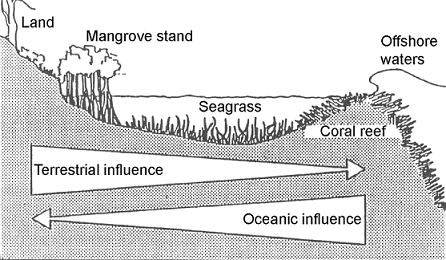Importance of coral reefs as ecological treasure
Coral reefs are considered as one of the most spectacular marine ecosystems on Earth.
They provide a habitat for thousand of species, both plants and animals. According to scientists, already 93,000 different species living on coral reefs worldwide have been identified, but they also estimate that this number comprises only a small percentage of the real number of species living around and in coral reefs.
This tremendous biodiversity consists of fishes swimming above and in the corals, animals living inside the framework of the corals and of course, the corals themselves.
But there is another reason why coral reefs are called "rainforests of the sea".
Coral reefs exist in close relation with other ecosystems, like sea grass beds and mangroves.
- Mangroves and sea grass beds interrupt large freshwater discharges. They stabilize salinity levels in the coastal zone and act as buffers or sinks for high sediment and/or nutrient concentrations in terrestrial run-off.
- Coral reefs protect the coastline against high wave action and erosion and, as such, create lagoons that favor the growth of mangroves and sea grasses.
- Coral-reef-associated species spawn and/or grow up in a sheltered sea grass or mangrove environment.
- Coral reefs serve as a shelter for fishes during storms.

Source: Ghent University.
